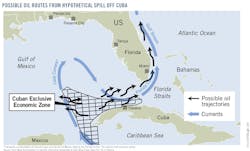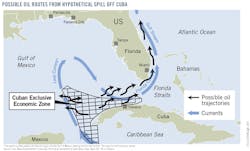International concern about the safety of offshore drilling and production adds urgency to the slow warming of relations between Cuba and the US.
The Cuban government, despite disappointing results of early oil and gas exploration, wants more deepwater drilling in the Gulf of Mexico, where an oil spill from a blowout such as the 2010 Macondo disaster off the US would threaten Florida and possibly other states on the Atlantic coast. The possibility of drilling in Cuban waters as close as 50 miles from the Florida coast has been a source of worry in the US (OGJ, May 21, 2012, p. 16).
Cuba has a thorough but untested offshore safety regime, which officials described at a groundbreaking symposium called Safe Seas-Clean Seas in Havana Oct. 19-22. But coordinating spill responses with the US would be difficult. Cuban regulation of offshore work differs from the approach adopted by the US government after the Macondo blowout and spill. And although the countries reestablished diplomatic relations on July 20, the 53-year-old trade embargo still in place against the island nation would hamper logistics during an emergency.
The continuing US restrictions on Cuba complicate safety planning for all countries in Gulf of Mexico-Caribbean region, where "any oil spill is likely to be a transnational event," pointed out former International Association of Drilling Contractors Pres. and Chief Executive Lee Hunt in Havana. A partnership of Hunt and Brian Petty, former IADC executive vice-president for global government affairs, organized the symposium.
Jay Hakes, former administrator of the US Energy Information Administration, told delegates that mutual concern about the safety of offshore drilling and production has improved relations between Cuba and the Bahamas. That effect fulfills an appeal made in the report of the BP Deepwater Horizon Oil Spill Commission, on which Hakes served as director of research and policy.
Acknowledging hopes by Cuba and Mexico to drill in deep water of the Gulf of Mexico, the commission's January 2011 report to President Barack Obama declared: "It is in our country's national interest to negotiate now with these near neighbors to agree on a common, rigorous set of standards, a system for regulatory oversight, and the same operator adherence to the effective safety culture called for in this report, along with protocols to cooperate on containment and response strategies and preparedness in case of a spill."
During the Havana symposium, Alexander V. Soloviev, a professor of oceanography at Nova Southeastern University in Dania Beach, Fla., outlined the environmental stakes. He described hazards to the US and Mexico from oil accidentally released in Cuba's area of deepwater interest, the Cuban Exclusive Economic Zone in the Gulf of Mexico. Floating oil could travel westward toward Mexico and northward into the Loop Current, formed by water warmed in the tropics that flows into the gulf west of Cuba and circles out through the Florida Straits to head northward along the US East Coast (see figure).
Offshore-safety specialists at the Safe Seas-Clean Seas symposium said oil could contact US coastlines within days of a spill.
Earlier meetings
The Havana event extended a series of lower-profile meetings between Cuban and US officials on safety cooperation, beginning with a visit by an IADC delegation to Cuba in August 2010. The US government then allowed IADC to invite Cuban officials to attend a May 2011 environmental conference in Trinidad and Tobago. The following September, IADC and the Environmental Defense Fund arranged a meeting in Havana between US and Cuban environmental officials. And US officials allowed IADC to invite Cuban delegates to an environmental conference in New York in 2013.
Other visits to Cuba by American officials have occurred, and representatives of the island nation have participated with officials of other regional countries, including the US, in development of "multilateral technical operating procedures" for joint spill response.
The latest meeting became possible only this year, when US travel restrictions were eased to allow nontourist visits to Cuba for specified purposes, including business conferences. About 120 delegates attended the event (for move coverage, see Editor's Perspective, p. 104).
Safety-case approach
At the symposium, Ulises Fernandez Gomez, international relations officer of the Cuban Ministry of Science and Environment, said his country's offshore safety regime differs from that of the US in its reliance on a "safety case" approach.
Modeled on the system adopted by the UK for offshore oil and gas work after the deadly explosion and fire in 1988 on the North Sea Piper Alpha platform, safety-case regulation assigns responsibility for risk identification and mitigation to regulated companies, who must assure regulators they're applying best methods to accident prevention and response.
The US offshore safety regime is prescriptive, reliant more on direction by regulators.
Cuba's regime assigns responsibility for accident prevention to the Cuban Office for Environment and Nuclear Safety Regulation (ORASEN), part of the environment ministry, and for mitigation to units of the defense ministry. According to Fidel Ilizastigui Perez and Reynol Diaz Veliz, both of ORASEN, the safety case program is embedded within a wider, prescriptive regulatory system.
After the Macondo tragedy, the government tightened oversight of offshore drilling, adding safety-case requirements for well integrity to the rig-process safety-case regulation already in place.
Raul R. Costa Gravalosa of the Civil Defense National Staff said Cuba's National Oil Spill Contingency Plan provides for a progressive response through three tiers, the third described as "full activation of national capabilities."
In a spill, primary responders for well control and surface operations for oil containment and removal would be operators and contractors. They'd be supported by Cuba's National Response Organization. For coastal protection and shoreline clean-up, primary responders would be government agencies.
Five wells were drilled off Cuba during 2003-13, two by Repsol and one each by Malaysia's Petronas, Petroleos de Venezuela SA, and Russia's Zarubezhneft. Results were no better than hydrocarbon shows in some of the wells.
The Cuban government hopes drilling will resume as early as next year.
"Somehow, we should work together" on spill preparedness, ORASEN's Ilizastigui told his US counterparts at the symposium. "I think that's the most important message."
About the Author

Bob Tippee
Editor
Bob Tippee has been chief editor of Oil & Gas Journal since January 1999 and a member of the Journal staff since October 1977. Before joining the magazine, he worked as a reporter at the Tulsa World and served for four years as an officer in the US Air Force. A native of St. Louis, he holds a degree in journalism from the University of Tulsa.

